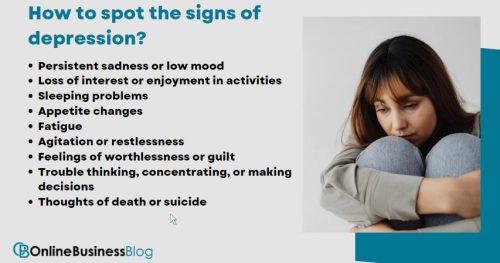Post Contents
What is Depression?
Depression is more than just feeling blue or having a bad day. It’s a serious mental health condition that impacts how you feel, think, and act. Depression can lead to a range of emotional and physical problems and can decrease your ability to function at work or home.
There are different types of depression, and it is important to seek help if you think you may be depressed. Depression is treatable, and there are many ways to get support if you or someone you know is struggling with this mental health condition.
What to do if someone tells you they have depression?
If someone tells you they have depression, it’s important to be supportive and understanding. You can start by asking them how they’re doing and if there’s anything you can do to help. It’s also important to encourage them to seek professional help if they haven’t already. You can offer to go with them to their appointments or help them look for a therapist.
If you’re not sure how to support someone with depression, there are many online resources available. The National Alliance on Mental Illness (NAMI) has a variety of articles and tips on their website. You can also find support groups in your area or online.
How to support someone with depression?
If someone you know is struggling with depression, there are things you can do to support them. First, learn as much as you can about depression. This will help you understand what your friend or loved one is going through and how you can best support them.
1. Be patient and understanding. Depression can be a very difficult thing to deal with, and it may take time for the person to recover.
2. Listen to them. Let them know that you’re there for them and that they can talk to you about anything they’re feeling.
3. Help them find professional help if they need it. A mental health expert must be consulted for the treatment of the serious condition of depression. If the person you’re supporting is reluctant to seek help, gently encourage them to do so.
4. Take care of yourself too. Supporting someone with depression can be emotionally draining, so make sure to take care of yourself as well. Get plenty of rest, exercise, and eat healthy foods. And if you start to feel overwhelmed, don’t hesitate to reach out for support yourself.
How to spot the signs of depression?
If you think someone you know may be depressed, it is important to look for the signs. Depression can manifest itself in many ways, and not everyone experiences the same symptoms.

How to spot the signs of depression?
1. Persistent sadness or low mood: This is perhaps the most obvious sign of depression. If someone you know seems to be in a low mood all the time, or if they seem sadder than usual, it could be a sign that they are struggling with depression.
2. Loss of interest or enjoyment in activities: Another common sign of depression is a loss of interest in activities that used to bring joy. If your friend or loved one no longer takes part in activities they used to enjoy, it could be a sign that they are depressed.
3. Sleeping problems: Both insomnia and hypersomnia (sleeping too much) can be signs of depression. Someone you know may be suffering from depression if they have trouble falling asleep or sleep more than usual.
4. Appetite changes: Changes in appetite are another common symptom of depression. Some people may lose their appetite altogether, while others may find themselves eating more than usual. Either way, changes in eating habits can be a sign that something is wrong.
5. Fatigue: Feeling tired all the time is another common symptom of depression. If your loved one seems especially exhausted, even after getting a good night’s sleep, it could be a sign that they are dealing with depression.
6. Agitation or restlessness: If someone you know seems especially agitated or restless, it could be a sign of depression. This may manifest as fidgeting, pacing, or an inability to sit still.
7. Feelings of worthlessness or guilt: Many people who are depressed feel like they are not good enough, or that they have done something wrong. If your loved one is talking about themselves in negative terms, or if they seem especially hard on themselves, it could be a sign that they are depressed.
8. Trouble thinking, concentrating, or making decisions: Depression can also affect someone’s ability to think clearly. If your loved one is having trouble concentrating at work, or if they seem to be forgetful and have trouble making decisions, it could be a sign that they are depressed.
9. Thoughts of death or suicide: One of the most serious signs of depression is suicidal ideation—thinking about death or suicide.
What not to do when supporting someone with depression?
If you’re not careful, you can easily make things worse when supporting someone with depression.
Here are some things to avoid:
1. Don’t try to fix them or make them feel better. It’s not your job to “fix” the person with depression — that’s their responsibility. Trying to do so will only put more pressure on them and make them feel worse.
2. Don’t tell them to just snap out of it. Depression is a real illness, not something that can be cured by simply willpower or positive thinking. Telling someone with depression to just snap out of it is insensitive and unhelpful.
3. Don’t ignore the problem or pretend it doesn’t exist. Depression can be very difficult to deal with, but ignoring it won’t make it go away. Pretending everything is fine when it’s clearly not will only make the person feel worse and more isolated.
4. Don’t be condescending or judgmental. Avoiding judgmental or condescending language is important in any relationship, but it’s especially important when supporting someone with depression. These kinds of comments will only make the person feel worse about themselves and less likely to seek help or support.
5. Don’t take over their life or try to control everything they do. It’s important to let the person with depression maintain as much control over their life as possible. Trying to take over or control everything will only further isolate them and make them feel powerless.
Conclusion
If you know someone who is struggling with depression, there are a few things you can do to support them. Firstly, try to be understanding and patient. Secondly, offer to lend a listening ear if they need someone to talk to. Finally, encourage them to seek professional help if they feel like they need it. Supporting someone with depression can be challenging, but it’s important to remember that your loved one is going through a tough time and needs your love and support.


